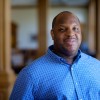This article is more than 5 years old.
Chris at the 2017 Charleston Conference
After hearing about the Charleston Conference for many years in the circles of conferences and workshops, I finally attended my first one this year thanks to a scholarship from Harrassowitz. Marketed as the event for “issues in book and serial acquisition,” the Charleston Conference was an event that covered so many topics and issues (pardon the pun) that it encouraged some deep thinking about the future of library acquisitions, regardless of format or the materials that were collected. Among the many ideas that were discussed, these were the ones that captured my attention.
- Publication ethics. With the publishing sector becoming even more crowded, authors have had to take more responsibility for where their work appears as well as determining if a publisher is either reputable or predatory. Meanwhile, publishers must earn the trust of those who submit to their publications while protecting themselves from plagiarism and related forms of academic misconduct.
- Artificial intelligence and libraries. We may be far from the futures of a machine-dominated world described in the Terminator and Matrix sagas, but artificial intelligence is becoming a reality in libraries in 2017. As the amount of data generated by researchers continues to grow exponentially, libraries can become active partners in its dissemination and development with machine learning that can process large sets of data. Further, libraries can assist this process by creating better, robust and cleaner metadata for these applications.
- “The Long Arm of the Law.” Carol touched on the “We Shall Overcome” portion this session in her post, and it was interesting to note some of the recent cases that could have an impact on libraries and scholarly communication as a whole. Whether it is Glassdoor’s appeal to keep the privacy of its users intact to a case before the European Court of Justice regarding the lending of eBooks, there will be plenty to watch over the next few years.
- Data science and library science. This was the session that I found the most intriguing. Conducted by a data scientist rather than a librarian, this was about the intersection of skillsets from both areas of expertise and how a project team could be assembled from both areas. The data scientist proposed that library science can tell the story that the data cannot tell on its own especially by explaining high-level concepts more broadly. As we continue toward the use of big data for various purposes, it’s important for both groups to coalesce around a set of standards and data strategies that make the process repeatable as well as the safeguard of data resources.
This was also my first visit to the city of Charleston, and it was a great walking city with so much to see and do. Although I will have make another trip to see more of its features, the highlight of this trip was definitely the South Carolina Aquarium that featured central tank that contained large fish, sharks, and even a sea turtle or two.
https://www.instagram.com/p/BbQZzoqjpnj/?taken-by=burriscj06
It was a pleasure to see so many colleagues and friends at this conference as well as making new contacts. I hope that I can return to the conference again!

2 Comments on ‘Chris at the 2017 Charleston Conference’
Great post, Chris. It sounds like Charleston provided some great information!
It was good to read another perspective on the conference!